10 Surprising Lessons of the Ukraine War So Far
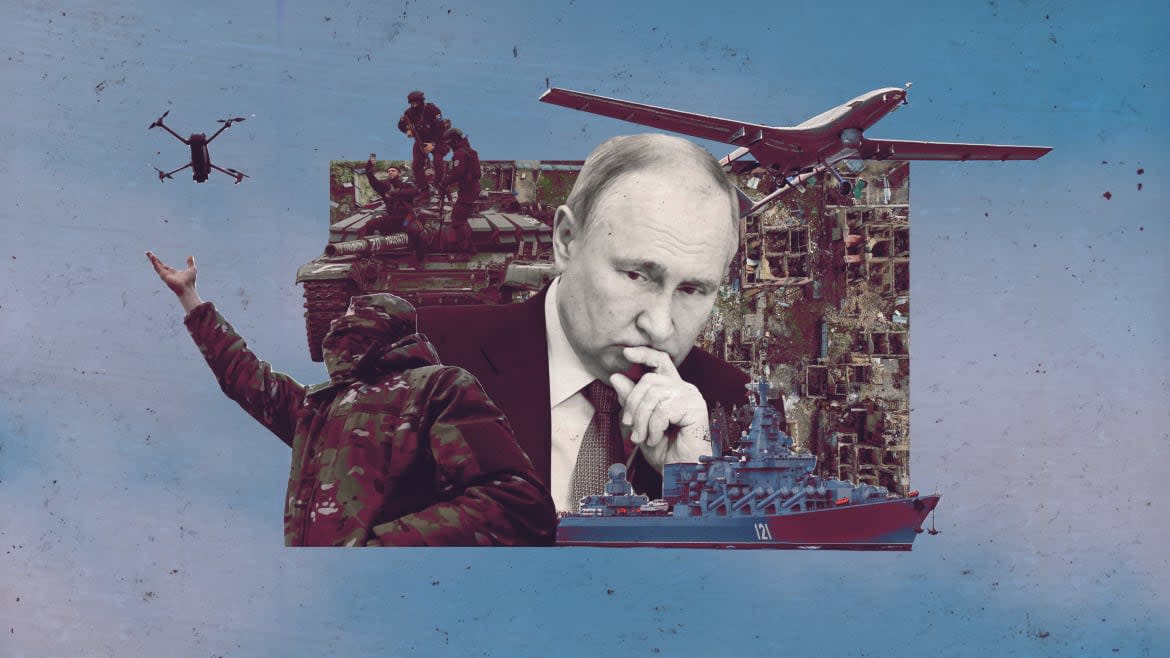
- Oops!Something went wrong.Please try again later.
In the year since Russia escalated its war against Ukraine with the invasion that began last February 24, we have learned a great deal about the nature of conflict in the world today.
The lessons extend far beyond the borders of Ukraine. And many of them have been every bit as surprising as President Joe Biden’s recent trip to Kyiv, some even more so.
Here are just 10 examples among many.
Biden’s Trip to Kyiv is the Ultimate Humiliation for Putin—and Trump
While Ukraine has pleaded for fighter jets for a year, unmanned aircraft have stolen the show.
Sure, Ukraine has long wanted NATO’s most modern jet fighters. And they should soon have them. But even without them, Ukraine was able to keep Russia from dominating the skies over its country with a combination of their existing air force, a growing assortment of missiles and drones. And both sides have seen the advantages of unmanned vehicles throughout the war—with a special shout out to Turkish Bayraktar drones and, from the Russians, a growing dependence on Iran’s drone products. The past year has been a big leap forward for unmanned vehicles (and that includes Chinese surveillance drones).
“No Time for Sergeants” was once a TV hit in America. It has been a flop for the Russian army.
Not only is the Russian army equipped with antiquated equipment, badly trained and badly motivated, but it’s top-down command system and especially its absence of effective non-commissioned officers has been a huge vulnerability on the battlefield. Ukraine, on the other hand, has benefitted from NATO training since this war actually began in 2014, to field capable squad leaders who are able to think quickly, take initiative and, time and again, tip the balance of battles toward Kyiv’s army.
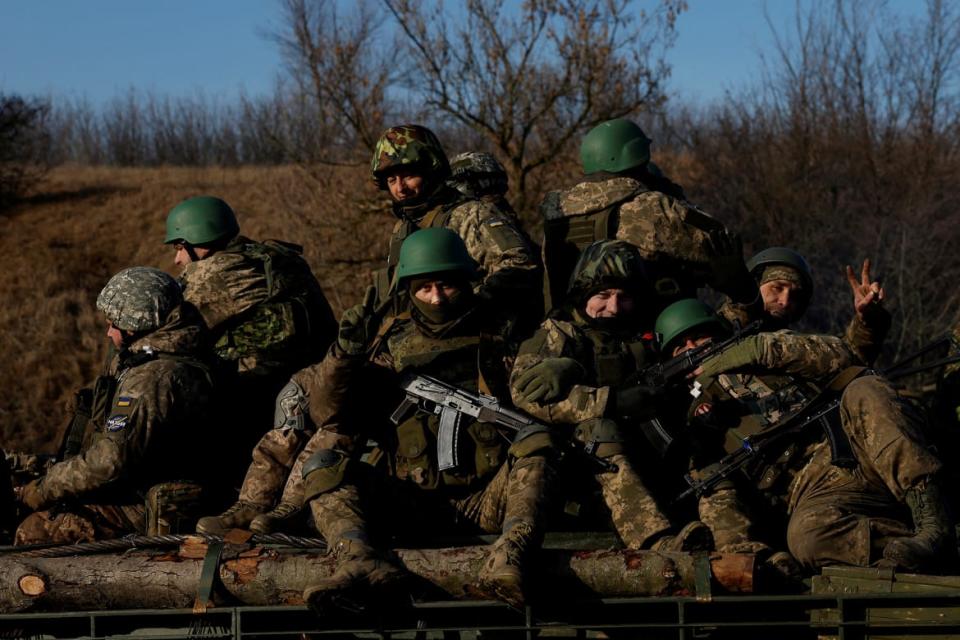
Soldiers from Carpathian Sich international battalion gesture while conducting manoeuvres near the front line, as Russia's attack on Ukraine continues, near Kreminna, Ukraine, January 3, 2023.
Speaking of time, it’s time for traditional navies to realize their time will soon be up.
When the Russian navy’s Black Sea Fleet flagship, the Moskva, was sunk, a combination of U.S. supplied intel and Ukrainian-made Neptune anti-ship missiles revealed how vulnerable warships are to new technologies. Not surprisingly (see point 1 above) drones also played a key role in the attack. Critics of plans to add U.S. carrier battlegroups seized upon these and other attacks to underscore that big, relatively slow, manned ships may follow World War II’s battleships on a course toward obsolescence. That doesn’t mean its over for navies. It just means they will have to change and adapt to new battlespace realities.
Poland is the new Germany. (And Estonia is the new France.) Germany was once seen as Europe’s unquestioned leader. But this war not only revealed the flaws in the Ostpolitik of its governments (too willing to accept dependance on Russia) but it also revealed divides within German leadership about how much to help Ukraine—even as the situation on the ground has grown more urgent.
Meanwhile, Poland and other states sharing a border with Russia and therefore recognizing the threat posed by Putin have stepped up, leading the way for NATO and the West on everything from accepting refugees to providing weapons. Estonia, Latvia, Lithuania, the Czech Republic and Slovakia have not been far behind. The strong moves by Sweden and Finland to join NATO,by other Nordic states to provide major support to Ukraine and by Switzerland to set aside its famous neutrality have also reset the balance of leadership within the treaty organization. With Russia’s threat likely to loom for years, this shift is unlikely to be reversed anytime soon.
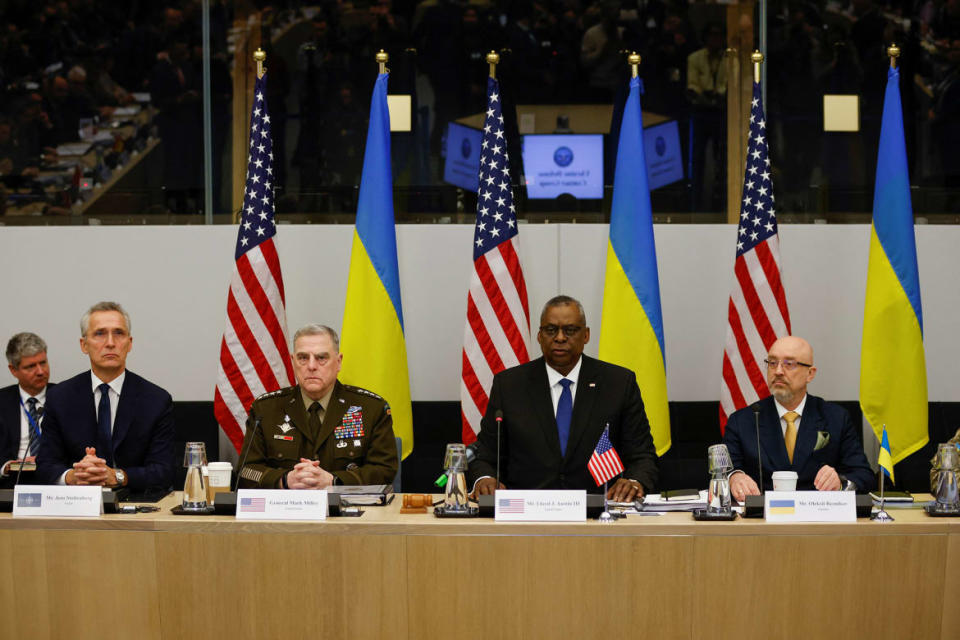
NATO Secretary General Jens Stoltenberg, U.S. Chairman of the Joint Chiefs of Staff Gen. Mark A. Milley, U.S. Secretary of Defense Lloyd Austin and Ukraine's Defense Minister Oleksii Reznikov attend a NATO defence ministers meeting at the Alliance's headquarters in Brussels, Belgium, February 14, 2023.
Vladimir Putin may be a madman, but at least he has the common sense not to want to be obliterated in a nuclear war with NATO.
For much of the course of the past year, the fear of Putin using nuclear weapons has been a major constraint on Western aid flows to Ukraine. But gradual escalation—well handled by the West and particularly by the Biden administration—combined with clear public and private diplomacy around the issue have managed the threat. And now, perceptions exist that threat may have been overstated. While experts warn against complacency on this front, the reality is that more could have and should have been done sooner. After all, Putin couldn’t handle the Ukrainian military, surely he knows that confronting NATO on the battlefield would be an epic catastrophe for him.
Putin’s Headed Toward Defeat in Ukraine. The Only Question Is How Bad a Loser He’ll Be.
Speaking of Putin, stick a fork in him. He may not be quite done yet, but he will be soon… and besides if anyone deserves to have a fork stuck in him, it’s Putin.
Putin has a strong hold on power in Russia. That may be the problem. This was is on him and him alone. While Russia has been resilient in managing wide-ranging Western sanctions, they are taking a toll. It is estimated a million Russians have fled the country. And the likelihood of a successful outcome for Russia is low. In the end, that’s a bad mix of circumstances even for an ensconced master thug like Vlad. That’s why some experts are contemplating Kremlin regime change as a legit possibility.
TikTok is more than just an annoying teenage time-waster and Chinese espionage plot.
Ukraine’s masterful use of social media has played a major role in shaping global public opinion about the war. From the first videos of Ukrainian President Volodymyr Zelensky after the February onslaught began through the circulation of viral videos that became rallying cries in the war’s early days to even tapping into the power of cat videos to win international support Ukraine has mastered the modern information battlefield. In fact, TikTok and similar platforms have played such an important role, early on observers began referring to this new element of conflict as the TikTok War.
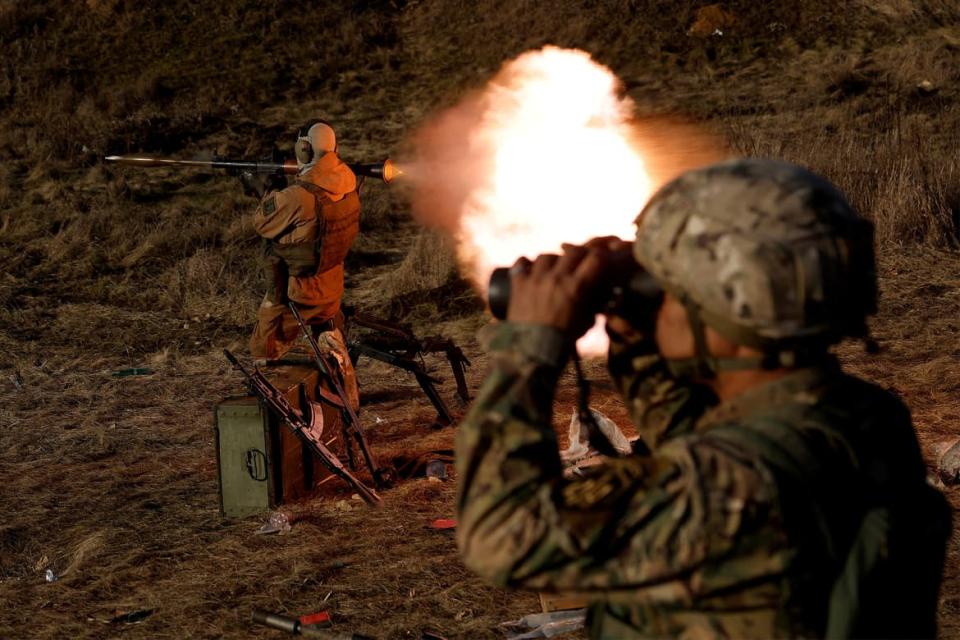
A soldier from Carpathian Sich international battalion fires an RPG while conducting manoeuvres near the front line, as Russia's attack on Ukraine continues, near Kreminna, Ukraine, January 3, 2023.
Ukraine is already in the EU and NATO whether you (or Russia or Turkey) like it or not.
Putin said he was launching the war to keep Ukraine out of NATO. While that was a long shot a year ago, today, it is not only more likely but within the past few months Zelensky has been calling the country a de facto NATO member. That’s because it is. After all, no NATO member has ever received more assistance from NATO during a conflict than Ukraine has this past year. And Ukraine has also said it wants to join the EU within the next two years. That’s ambitious. But with the EU likely to have to pick up the lion’s share of the massive tab to rebuild Ukraine, Europe’s vested interest in the battered country is only like to grow massively in the years ahead.
With friends like Turkey, Israel, the global South and Elon Musk, who needs enemies?
The support of NATO for Ukraine has been a huge story of the past year. But another has been the fact that many countries worldwide have sought to stay out of the fight. That has been frustrating for the US when some of the countries want to maintain special status as friends and allies. That has been especially uncomfortable with special relationship allies like Israel.
Meanwhile, NATO ally Turkey has dragged its feet on approving Swedish and Finnish accession to the alliance. And even entrepreneurs who depend on the US for big bucks, like Elon Musk have parroted Russian party lines and started to block access to key technologies to Ukraine.
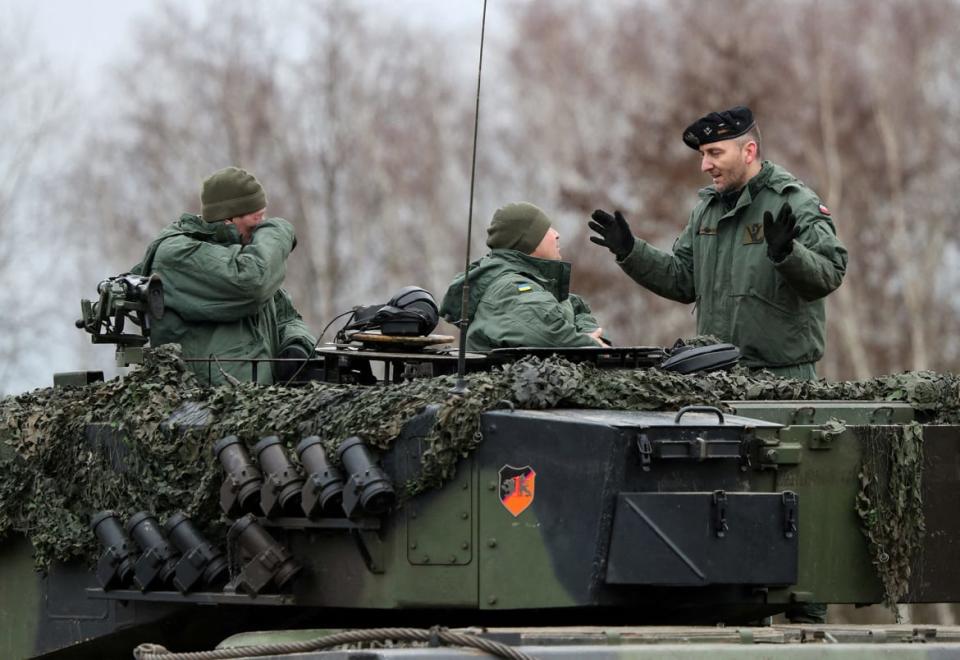
Polish instructors and Ukrainian soldiers train on Leopard 2 A4 tanks in the 10th Armoured Cavalry Brigade in Swietoszow, Poland February 13, 2023.
And the most important lesson of all is, as it will be for the remainder of this century, everything is always about China.
A key lesson of our time is that no matter the issue, China figures in the calculus. This covers everything from U.S. domestic economics to the war in Ukraine. A TikTok war? Who owns TikTok? Russia on the move? Who’s Russia’s “best friend.”
China was shaken by Russia’s failures in Ukraine. And many see Ukraine as an analogue for a potential Chinese invasion of Taiwan. That includes the Taiwanese.
Most recently, of course, the China factor in the Ukraine equation has changed, with public warnings this week from U.S. Secretary of State Antony Blinken that China is considering supplying lethal aid to Russia.
Such support would be a profound mistake for Beijing, not just worsening an already tense U.S.-China relationship, but putting China at odds with the entire international coalition supporting Ukraine. China would not only be escalating the stakes in the conflict, but it would become culpable for how its weapons were used by a Russian army already guilty, as Vice President Kamala Harris noted so powerfully in Munich last week, for crimes against humanity.
There have been other so-called surprises, of course, although in retrospect, perhaps these should not have been quite as unexpected. The U.S. has had a sharp reminder that our weapons production capacity is not what it needs to be if we need to ramp up quickly for a major conflict. We have also seen what might have once been a surprising amount of support for the world’s most notorious war criminal from one of America’s two major political parties. But post-Trump, why would that be unexpected.
Mr. Zelensky Goes to Washington as a Winner
Another category of what have been characterized as surprises are really just manifestations of the bad judgement, out-of-touchness and ineptitude of Vladimir Putin.
For example, it certainly came as a surprise to Putin that the United States and NATO would step up and support Ukraine as resolutely as they have. But knowing Joe Biden’s views on Putin and Russia and knowing that Europe would see the threat against Ukraine as a threat against all of Europe, the response should have been factored into Russia’s plans…which it clearly was not.
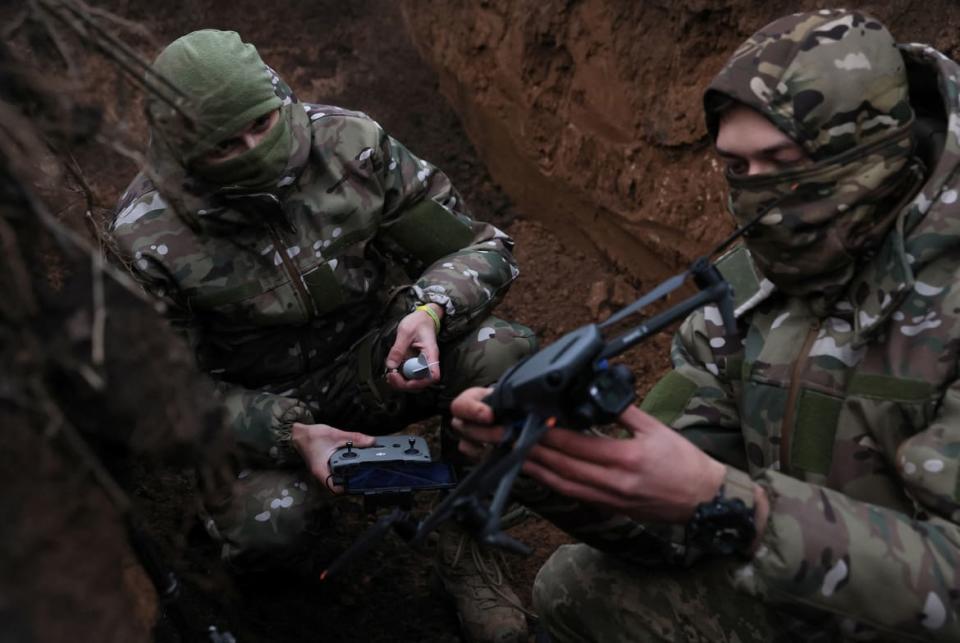
Two soldiers with the 58th Independent Motorized Infantry Brigade of the Ukrainian Army who wanted to be identified as "Ghost," 24, and "Soap," 30, arm a drone with a modified grenade to test it, as Russia's invasion of Ukraine continues, near Bakhmut, Ukraine, November 25, 2022.
Similarly, another Putin miscalculation was not realizing that Europe would ultimately make the decision to move beyond dependence on Russian energy. That is one that will be kicking Putin and Russia right in the (once) meaty part of their economy long after the fighting has stopped in Ukraine.
Perhaps the greatest surprise to Putin, of course, and the biggest reason this war will go down as the signature disaster of his catastrophic tenure as leader of Russia, is the courage of the people, military, and political leadership of Ukraine. Putin let his prejudices and his narcissism get the best of him. He underestimated his foe and their commitment to defending their own land even though the history of conflicts from Vietnam to Afghanistan should have been a warning to him.
Which brings us to one more final big surprise from this war: the degree to which the best intelligence services in the world overestimated Putin and the Russian military. In just one year, they have gone from a reputation of being the second-best army in the world to clearly being the second-best army fighting on the ground in Ukraine—and victory seems likely to elude them for a long time to come. Which suggests that in months ahead, if this war remains true to form, that we should prepare ourselves for many more twists and unanticipated turns to come.
Get the Daily Beast's biggest scoops and scandals delivered right to your inbox. Sign up now.
Stay informed and gain unlimited access to the Daily Beast's unmatched reporting. Subscribe now.

